


"Comrade President Vladimir Putin." Captain Ibrahim Traoré, with his red beret fitted on his head and his muscular build tightly bound in leopard-print fatigues, paid tribute to his host before launching an anti-imperialist tirade. The lasting image of the Russia-Africa summit held in St. Petersburg on July 28, 2023, is the collusion between the young officer from Burkina Faso, the face of the coup d'état that took place 10 months earlier in Ouagadougou, and the solicitous head of the Kremlin. "We share the same history in the sense that we [Russians and Africans] are the forgotten peoples of the world," the putschist leader proclaimed with a solemn tone, before concluding with a "Homeland or death, we will win" applauded by an enthusiastic Vladimir Putin.
Let's face it: Russia's presence in Africa is no longer a fantasy. It is no longer the mirage it was initially believed to be, a fictitious product of information warfare. It is now a geopolitical reality, a pervasive if not lasting one, a reshuffling of the cards between the powers south of the Mediterranean Sea. In Sudan, Niger, Libya, Burkina Faso, Mali, the Central African Republic (CAR) and Madagascar, Moscow has been weaving a web of influence since 2017 and 2018 to serve its new agenda of confrontation with the West, against the backdrop of a war in Ukraine that is rekindling the East-West divide.
The death in a plane crash on August 23, 2023, of Yevgeny Prigozhin, the head of Wagner, the paramilitary group that was the secret weapon of Russian penetration into Africa, did little to change this. One year on, the Kremlin continues to shift its pawns. The only difference is that it now does so openly. Far from its long-standing denial of the alarm bells rung by Western governments, Putin's Russia no longer masks its actions. Its Ministry of Defense has – for the most part – taken over the "empire" built by Prigozhin, particularly on the African continent.
A high-ranking officer like Yunus-bek Evkurov, deputy defense minister, is constantly on the move across African capitals to fine-tune security agreements. Apart from Mali and the CAR, Wagner's label has all but disappeared from Russian groups in Africa, replaced by an Africa Corps, whose choice of name is surprising – Afrika Korps was Nazi Germany's army corps that operated from Egypt to Tunisia, under the command of Field Marshal Erwin Rommel, from 1941 to 1943.
However, it remains to be seen whether this "clone" can match the effectiveness of Prigozhin's former jewel – a multifaceted complex combining military, economic, political and media assets. If Putin's former chef had been able to break through, it was precisely because Wagner's increasing autonomy, which ultimately proved fatal after his mutiny in June 2023, had freed him from the constraints of the official hierarchy. Will the return to centralized control under the banner of Africa Corps be as successful?
You have 85.32% of this article left to read. The rest is for subscribers only.
